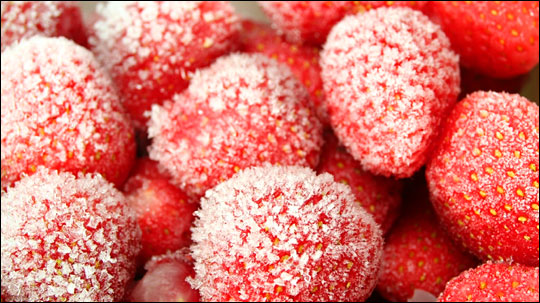In Checkout Line, Lou Bendrick cooks up answers to reader questions about how to green their food choices and other diet-related quandaries. Lettuce know what food worries keep you up at night.

Dear Lou,
What’s the deal with freezer burn, that white discoloration that occurs when something is left in the freezer too long? What is it exactly and is there any problem with eating food that has freezer burn?
Ross Conrad
Dear Ross,
Because I know you are a beekeeper (author of Natural Beekeeping: Organic Approaches to Modern Apiculture — nothing gets by this intrepid reporter), I feel the need to say that I just adore bees! Not only do they look cute when they sleep in flowers, but they make yummy food by spitting, which is more than most of us can say.
Now on to your fine question: Freezer burn is no laughing matter (wipe those smirks off your faces — I know who you are, too). Here’s why this little oxymoronic food term is important: Many of us are eating fresh, sustainable food these days and such foods do not have the shelf life of a Marshmallow Peep. This means that we all need to know how to store “real food” (as opposed to processed food) to retain maximum flavor, texture, and all of those nutrients.
Storage know-how is especially apropos this time of year, when fresh produce is so bountiful that you might be wondering: What the heck do I do with all of this zucchini? (A: Leave it on your neighbor’s porch, ring the doorbell, and run.) What’s more, Ross, freezing also happens to be my favorite method of preserving food!
Not only do I love it because it is easy and fun, but also because to me home canning is like fugu — a culinary thrill-sport best left to the brave or the skilled. (I’m lame in other ways, too: I can neither knit nor sew an A-line skirt to save my keister.) Freezer burn is the nemesis of the home food preserver, much in the way Mothra was the nemesis of Godzilla. (OK, granted, this is a weird analogy, but I’m trying to sex up a food storage column! Go with it! Work with me, people!)
Naturally, I decided to consult a pro to tackle freezer burn so I called up Jananne Finck, a nutrition and wellness educator at the University of Illinois Extension. Finck, who teaches Master Food Preserver classes, said that freezer burn is the result of air being pulled out of the tissues of food. “Basically, it’s moisture loss,” she said.
The good news is that freezer burn doesn’t cause illness. The bad news is that freezer-burned food — which often looks whitish and a bit shriveled — tastes “off,” and makes the texture dry and tough.
Finck also explained that freezer burn is caused by either keeping food in the freezer too long or by using poor-quality packaging. (Sorry, but don’t recycle those yogurt containers for freezing your chicken stock!) So, always use containers that are meant for freezing: freezer bags (Finck advises to use these only once), freezer-specific plastic containers, or, my favorite, freezer-safe glass containers. I am also a big fan of my vacuum sealer, a gizmo which sucks the excess air out of special freezer-safe bags that come in rolls.
In addition, Finck offered these two quick tips for successful freezing:
- When you’re freezing vegetables, make sure to blanch them. “Most vegetables require blanching to inactivate the enzymes,” she says. (The naturally occurring enzymes in fresh foods hasten spoilage.)
- Make sure the temperature in your freezer is zero degrees or lower. To check, Finck recommends that you get a freezer thermometer.
How long will food stored in the freezer keep? We’re probably not talking Marshmallow Peep-style longevity here. To find out how long various foods will keep in the freezer, and for other food preservation tips, click on over to the National Center for Home Food Preservation.
Before we depart, Ross, I have a honey-related freezer tip for you, because I appreciate people who care for our wee pollinators: According to my favorite food-preservation book, Preserving Summer’s Bounty, you can keep frozen apple slices from darkening when you freeze them by dipping them in a solution of one cup of honey mixed with one cup of water and the juice of one lemon.
Bee well yourself,
Lou Bendrick

